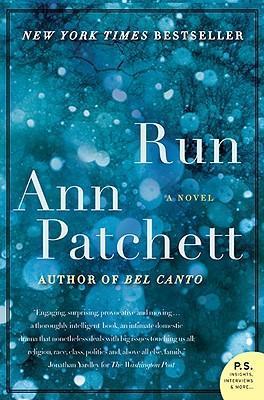The Book Club Online is the oldest book club on the Internet, begun in 1996, open to everyone. We offer cordial discussions of one book a month, 24/7 and enjoy the company of readers from all over the world. Everyone is welcome.
Everyone is welcome
RUN by Ann Patchett
 | Two families come together in a traffic accident during a snowstorm. It quickly becomes clear that the families-a poor, single black mother with her 11-year-old daughter and a white, Irish Catholic, former Boston mayor with a biological son and two adopted black college-aged sons, whose much-loved wife died over 20 years ago -have a connection.
"The book explores how these kids established their sense of belonging and self based on who raised them, and whom they gravitated toward as family. It also conversely examines the notion of parenthood - what constitutes a parent? Is it simply genetics, or a history of nurturing and love? What role does race play in parenting and familial identity? There are clearly nature vs nurture issues at play here, which are interesting to trace and analyze." (Gayle Weisswasser)
And yet, in an interview, in the back of the paperback edition, Ann Patchett said that to her, the book was about politics. The book's central idea is how political responsibility plays out in the smallest and most intimate scale of family life. How did such an idea come to her?
A: "I keep reading the newspaper and looking at all of the hardships in the world and it makes me think about issues of sacrifice and social responsibility. Do we have a moral obligation to use our gifts to help people? These aren't questions that have a right and wrong answer, but I think they are ideas worth struggling with. Run is ultimately a novel about secrets, duty, responsibility, and the lengths we will go to protect our children."
|
*********************************************************************************
Discussion Schedule:
June 15~17Chapters 1-3
June 18~20 Chapters 4-6
June 21-24 Chapters 7-9
June 25-26 Chapters 10
June 27-30 Chapter 11 and final thoughts |
Some Topics for Consideration
June 15 - 30
Chapter 11 and Final Thoughts
1. Father Sullivan played a pivotal role in deciding the statue's owner and dividing the family. Did he continue to play a significant role in the book? What would the book have looked like without him?
2. Understandable that Teddy would feel guilt and the need to do penance for both Tennessee's death and his uncle's collapse, but why did Tip feel so much guilt that he went to Med school for his penance? What made him decide to go back to ichthyology on his graduation day?
3. Did Tip expect that Doyle would give him the statue for a graduation present? How did you react to his decision to bestow the heirloom statue on Kenya, a girl who has literally shared nothing with his former wife, Bernadette? Do you think he made the same decision his wife would have made?
4. Towards the end of the story we see images of four mothers (including the Virgin Mary) on Kenya's dresser. What is the author saying about women and mothers to have them all there together?
5. The boys kept finding similarities in their "sister" Kenya – when the fact was…she wasn't related at all. Even Doyle was noticing the physical similarities….were they seeing it because of suggestion?
6. Did you squirm at the idea that Kenya will never know that Tennessee was not her mother or did this lack of information fit in with Ann Patchett's purpose? What is she saying about nature and nurture here?
7. What is the author's underlying message here? Is she presenting a new definition of family, a commentary on socioeconomics or something totally different?
8.
Run includes several incidences of doubling—two brothers who get adopted, two mothers who die, two men named Sullivan, two Tennessee Alice Mosers, two accidents involving hospital stays. What is the effect of seeing similar characters and events repeated over the course of the book?
9. Of the many characters in
Run, which did you feel most connected to on an emotional level? How do you explain that connection?
10. Are you satisfied with how the author tied up the issues of race, family, parental responsibilities? What would you want changed or delved in to with greater depth?



